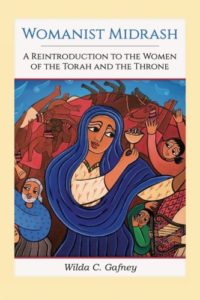Cyber Monday: Buy Womanist Midrash for yourself.
Christmas list: Buy Womanist Midrash for your pastor.
Year-end sales: Buy Womanist Midrash for your local library.
New Year’s resolution: Study Womanist Midrash. Take your time with the story & study of biblical women. Excavate your assumptions, your childhood Sunday School lessons, and even (or most of all) your seminary studies. Preach about women, named and unnamed. Write about women, empowered and forsaken. Tell the truth about women, enslaved and sexualized, erased and marginalized, ancient and modern. Claim imagination: its place in scripture and its indispensability in faith.
 The Rev. Dr. Wil Gafney’s Womanist Midrash: A Reintroduction to the Women of the Torah and the Throne is a stunning and invigorating work. Gafney’s academic depth, breadth of imagination, and contextual integrity to both language & culture make Womanist Midrash an authoritative resource for biblical scholars, pastors & preachers, and lovers of Scripture alike. This book is one to earmark, underline, highlight, and reference thoroughly and regularly — not because the sacred texts & Gafney’s hermeneutic are easy on one’s spirit, but because the womanist lens on Scripture is a holy force that will change & bless all those who wrestle with it.
The Rev. Dr. Wil Gafney’s Womanist Midrash: A Reintroduction to the Women of the Torah and the Throne is a stunning and invigorating work. Gafney’s academic depth, breadth of imagination, and contextual integrity to both language & culture make Womanist Midrash an authoritative resource for biblical scholars, pastors & preachers, and lovers of Scripture alike. This book is one to earmark, underline, highlight, and reference thoroughly and regularly — not because the sacred texts & Gafney’s hermeneutic are easy on one’s spirit, but because the womanist lens on Scripture is a holy force that will change & bless all those who wrestle with it.
I am, for example, struck anew and mesmerized by Gafney’s examination of Rachel (Jacob’s second wife): her role & responsibility as a shepherd — how have I overlooked that detail in such a familiar story?; her loyalty to her family’s gods over Jacob’s gods — is this why she died, not because of difficulty bearing Benjamin but because her gods were taken away?; the text’s lack of attention to whether Rachel had affection for Jacob — despite our romanticization of Jacob’s affection for Rachel. Why & how have I come to accept the story of a disempowered Rachel, without say over her faith or her marriage or her sex life or her reproductive choices, when in fact she staked her claim on as many of those choices as she was able? Would I not (do I?) affirm the same authority of choice for women today?
Sometimes biblical texts & stories are so familiar that we neglect the details, or we neglect to realize how many of the details we’ve assumed into the stories. And sometimes biblical texts & stories & people — women, especially — are so unfamiliar that we don’t realize we’ve overlooked them, like how many women are unnamed but essential & present when a phrase such as “Israelites” or “people of Israel” is used in Scripture, or how many non-Jewish women & children are killed or enslaved every time the Israelites invade a new region of the Promised Land.
Womanist Midrash is a gift of remembering what is too often forgotten, of claiming & centralizing those who are too often degraded, of holding fast & fierce onto that which is hard for the sake of life and Life. It is a must-read for those who wrestle with Scripture.
